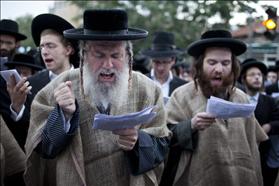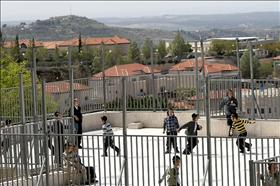The Israeli public wants YOU!
Israelis support equality in sharing the burden, but are uncertain about the Peri Law
In the 2013 Religion and State Index, a wide majority of Israelis expressed support for drafting ultra-Orthodox men and other significant measures to equally shoulder the national burden.
17/09/2013 12:58
Tags: Equality in Sharing the Burden · Yeshiva Budget · Core Curriculum · Religion and State Index

Haredim at a prayer session protesting the governments intention to draft more Yeshiva Students. Photo: Jonathan Sindler, Flash 90
"Equality in sharing the national burden" is a cumbersome term that describes the one religion and state issue to make its way to the forefront of Israeli politics in the last few years. The media and policymakers often use this title to refer to drafting ultra-Orthodox men to the army, but the term includes integrating the ultra-Orthodox sector into Israeli society through education, employment and national service as well. In the 2013 Religion and State Index, the issues that fall into the category of equality in sharing the burden enjoyed widespread support from the Israeli public. However, the study also indicates that Israelis are divided over whether the government is indeed able to draft ultra-Orthodox men without creating a serious rift in Israeli society.
National Service
82% of Israeli Jews support national (army/civil) service for ultra-Orthodox men. This percentage consists of 51% support for army service (with or without exemption for a small amount of exemplary students) and 31% support for civilian national service. These results are almost identical to last year's results (83% supported mandatory military or national civilian service). Immigrants demonstrated the strongest support- 57% are in favor of drafting ultra-Orthodox men for full national service. That is compared to 43% of Secular Israelis who hold the same position. Mandatory service is backed by all political affiliations in the non-Haredi sector. 99% of Yesh Atid voters support compulsory service for ultra-Orthodox men and 100% of Labor Party voters, 92% of Likud Beiteinu voters, and 89% of Habayit Hayehudi voters support the measure. It is noteworthy that mandatory civilian service is receives more support from left-wing Israelis while mandatory army service is supported more by right-wing Israelis. Israelis clearly want equality in national service but are divided as to whether or not the Peri Law will actually bring that equality.
Equality in Sharing the Burden has enjoyed not only attention from lawmakers but support from the Israeli public as well.
Respondents were split regarding the government coalition's plans for drafting ultra-Orthodox men. The plan includes a deferral for four years and will only draft the men at age 21. Until then all ultra-Orthodox yeshiva students will receive a complete exemption from military service. 53% of Israeli Jews are opposed to the plan and 47% support it. But among the non-Haredi sectors in Israel (ultra-Orthodox Jews are opposed to the plan because it includes mandatory service and intends on criminalizing draft-dodging) the numbers are evenly split down the middle. 51% of Yesh Atid voters support the plan and 53% of Likud Beiteinu voters also support it. 55% of Labor Party voters oppose the plan and 25% of ultra-Orthodox party voters support it.
Click here to view Hiddush's analysis on the Peri Law proposal
Budget cuts and raising the stakes for housing benefits
The government drafted a new state budget with serious cuts to ultra-Orthodox yeshivas as an attempt to motivate males in the ultra-Orthodox sector to seek employment. 75% of Israelis support this type of cut and only 25% are against it. Among non-Haredi Israelis, 82% support the budget cuts. 94% of the ultra-Orthodox and 54% of Modern Orthodox Israelis oppose the cuts. The support for budget cuts from university graduates stands at 87% compared to 64% for those with a high school diploma and lower. 91% of Yesh Atid voters, 84% of Likud Beiteinu voters, and 68% of Habayit Hayehudi voters support the budget cuts to yeshivas. The gap between Habayit Hayehudi voters (once thought to consist mainly of Modern Orthodox Jews) and the rest of the Modern Orthodox sector most likely comes from the large amount of traditional and secular Israelis who voted for the Habayit Hayehudi in the past elections. The government decided to stipulate affordable housing for Israelis based

Haredi school children in Beitar Illit playing on the roof of the school. 22.03.2010. Photo: Nati Shohat, Flash 90
on employment status or on attempts to seek employment. These new criterion will make it difficult for families of yeshiva students to receive the benefits and will give preference to employed citizens. This reform reflects the public consensus on this issue. 80% of Israelis and 87% of the non-Haredi population support these conditions. Ultra-Orthodox Israelis are the only population that greatly opposes this new policy (90%) and the 77% of the Modern Orthodox sector supports it.
The new conditioning for housing benefits enjoys non-partisan support: 83% of Likud Beiteinu voters, 91% of Yesh Atid voters, and 95% of Labor Party voters support the change.
Education for ultra-Orthodox children
79% of Israelis believe the government should require ultra-Orthodox schools to teach core curricular subjects (Math, Science, Civics, and English). Since 2010, there has been consistent public support (75-80%) for core curricular studies in ultra-Orthodox schools. 86% of the non-Haredi sector and even 57% of the Modern Orthodox sector support the education reform. 63% of Israelis believe the government should suspend funding to schools that do not teach the core curriculum. This public support is reflected in the Education Ministry's current plan to decrease funding for these schools. 29% of those who support implementing the core curriculum believe there should be fines for evading schools. 81% of Secular Israelis and 72% of immigrants believe in suspending the funding for schools that do not teach the core curriculum. 90% of ultra-Orthodox Israelis and 60% of National Religious Israelis are opposed to the potential requirement. 77% of Labor Party voters and 83% of Meretz, Hatnuah, and Kadima voters believe in suspending funding for schools that do not teach core curriculum.